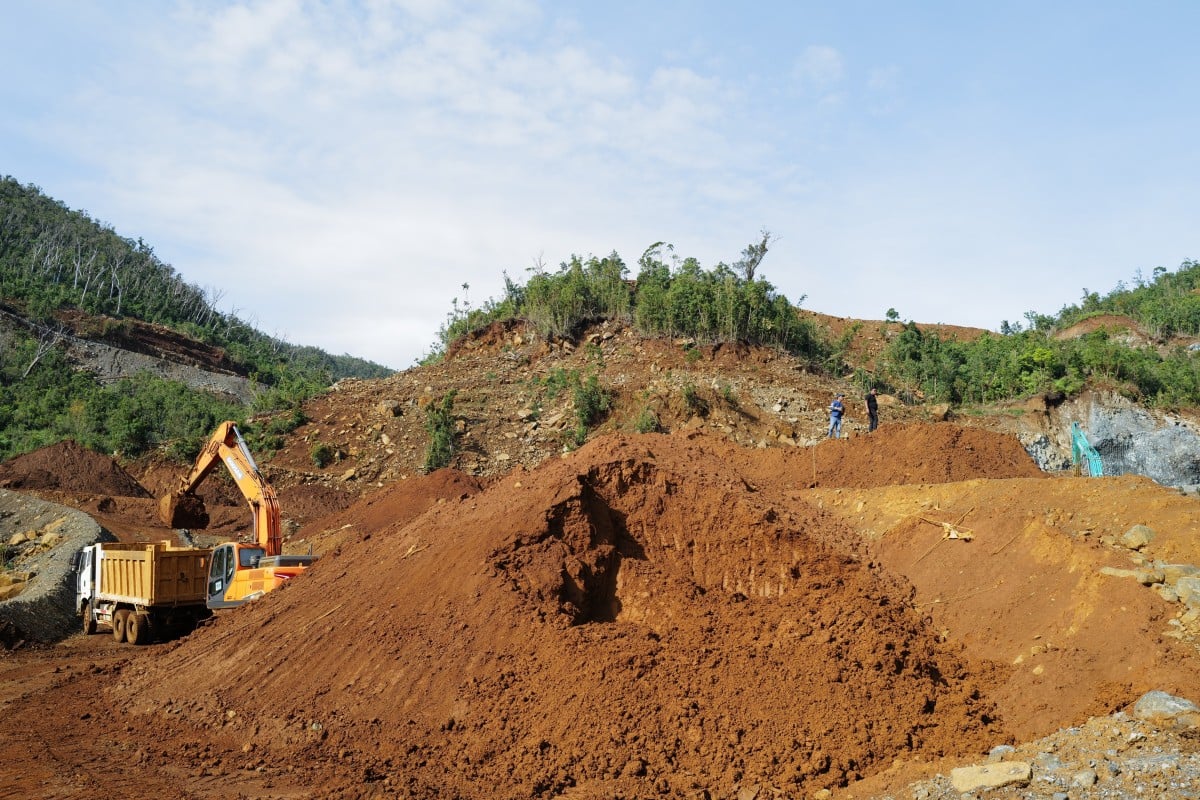Nickel is vital to the global green transition, but its extraction is bringing environmental disaster to Filipinos on the front line.
When the rains fall over Madrid, a quiet rural town in the southern Philippines, muddy brown torrents sweep through rice fields and homes.
For Beth Samblado, the floodwater is a recurring reminder of a struggle she and her neighbours in Surigao del Sur province have waged, largely alone, against nickel mining.
“We’re asking the government again to please stop the mining,” the 51-year-old told This Week in Asia in Filipino from her modest eatery in the town centre.
Years ago, she and her fellow parishioners led mass protests, urging officials to reconsider the licences granted to mining companies.
But their pleas went unanswered. To this day, nickel mining continues unabated, Samblado says – and with it, the floods.
“We’ve seen what happened in places like Cebu,” she said. “If we don’t stop the mining here in Madrid and nearby towns, we’ll be the ones to suffer.”
Dozens were killed in the central Philippine island of Cebu earlier this month as Typhoon Kalmaegi tore through the country. At least some of the deaths from flash flooding and landslides have been attributed to mining, quarrying and poor urban planning.
In the nearby province of Agusan del Norte, Cecilia Tumalis has watched three consecutive planting seasons fail, each undone by flash floods she attributes to deforestation linked to mining.
We didn’t have problems with our crops before the nickel mining began
Cecilia Tumalis, Filipino villager
“The mining firm and even the local government haven’t helped us”, Tumalis said, recounting a similar story to Samblado’s of cloudy brown water ruining her village’s harvests.
“We didn’t have problems with our crops before the nickel mining began.”
Environmentalists say the open-pit methods used in nickel extraction strip away nutrient-rich topsoil and vegetation, damaging soil fertility and disrupting ecosystems.
The Philippines is the world’s second-largest nickel producer, exporting some US$1.04 billion worth last year alone, according to official figures – much of it bound for China.
Nickel mining operations have been rapidly expanding across the southern Philippines.
In Claver town, Surigao del Norte, Chinese barges line the coast, waiting to load nickel ore. Mountainsides visible from the highway have been stripped bare by mining activities. And on Dinagat Island, declared a mineral reservation in 1939, extensive deforestation is apparent deeper into the island, particularly near Cagdianao town.
Broken promises
A report published this month by US-based NGO Climate Rights International called on nickel mining companies and their downstream clients, including electric vehicle and battery manufacturers, to take urgent action to prevent and redress environmental damage and human rights abuses resulting from mining activities.
In its 125-page report, titled “Broken Promises: Philippines Nickel Mining Threatens Rights and Increases Climate Vulnerability”, researcher Krista Shennum said the extraction of nickel – though vital to the global energy transition – was destroying farming and fishing livelihoods, causing food insecurity and polluting drinking water.
“The urgency of the climate crisis should not be used as an excuse for the endless extraction of minerals like nickel and the serious impacts to frontline communities and ecosystems,” Shennum said.
“The government needs to prioritise the rights and well-being of frontline mining communities who bear no responsibility for the climate crisis by holding companies accountable for abuses and environmental harms.”
At the report’s launch on November 4, Shennum called for an immediate moratorium on new mining permits until the industry could demonstrate full compliance with environmental and human rights laws.
“We’re calling on the government to stop permitting new mines until the industry cleans up its act,” she told reporters. “If the industry is not following laws, if it’s not fully enforcing and complying, then to add more mines is quite concerning.”
Surging demand for EVs in the Philippines underscored the urgency of the crisis, Climate Rights International said. EV sales in the country have soared from 1,000 units in 2022 to more than 20,000 in the first nine months of 2025.
“If EV companies want to position themselves as global leaders in the fight against climate change, they must demand that mining companies in their supply chains respect the rights of communities and end environmentally destructive practices,” Shennum said.
‘False solution’
Despite these warnings, President Ferdinand Marcos Jnr has reaffirmed his administration’s support for the mining sector.
Speaking at the Mining Philippines 2025 Conference and Exhibition last month, he insisted that mining operations had to align with international environmental commitments and did not endanger lives in host communities.
“Irresponsible mining has no place in our nation. We will strictly enforce the laws against practices that destroy forests, that poison rivers, that endanger lives,” he said.
“Mining should build communities, not burden them,” Marcos added, stressing that mining revenues must deliver tangible benefits to Filipinos.
A post-extractivist, just and sustainable transformation is the only way forward
Jaybee Garganera, anti-mining advocate
Yet critics argue that the government’s embrace of mining, justified as part of the global clean-energy transition, perpetuates a cycle of exploitation.
The current extractivist approach was a “false solution to the climate crisis”, said Jaybee Garganera, national coordinator of the environmental advocacy organisation Alyansa Tigil Mina (“Alliance to End Mining”).
“More mining of nickel, copper, cobalt and other transition minerals for the so-called green transition is a false solution to the climate crisis because it merely perpetuates the system that brought about ecological destruction and social injustice,” he said in a statement.
“A post-extractivist, just and sustainable transformation is the only way forward. The dignity and well-being of peoples, and the health of the environment, must be at the centre of any solution to the climate crisis.”
Source - https://www.scmp.com













